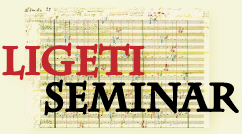6) The Eighties; Old Genres, New Meanings
The shock of the Horn Trio; the first book of the Études pour piano and new choral works.
For week 7
Read
Paul Griffiths, Referencings, Modern Music and After (Oxford: Oxford University Press, 2010).
György Ligeti, program notes, Violin Concerto premiere with the Los Angeles Philharmonic (18 February 1993)
Frederick Knop, "Making it home? The natural sciences as a site of belonging in György Ligeti’s music," in György Ligeti's Cultural Identities, Amy Bauer and Márton Kerékfy, eds. (London, NY: Routledge, 2017), 92–100.
Helbing, Volker, "Tragedy and irony: the Passacaglia of the Violin Concerto," György Ligeti's Cultural Identities, Amy Bauer and Márton Kerékfy, eds. London, NY: Routledge (2017)), 230–45.
Listen
Radio 6: The Early Eighties: Old Genres, New Meanings
Analyze for May 14
10 Pieces for Wind Quintet, No. 3, (1968)
Questions here as Word doc. As pdf
Analyze for May 21
Passacaglia ungherese for harpsichord (1978)
Questions here as Word doc. As pdf
Further Reading
György Ligeti and Michael John White, "Fears of a clown," The Independent (October 18 1989)
György Ligeti and Stephen Sartory, "An Interview with György Ligeti in Hamburg," Canadian University Music Review/Revue de musiquedes universités canadiennes 10:1 (1990), 101-117.
György Ligeti and Stefan Niculescu, "Ligeti Face to Face: Gyorgy Ligeti and Stefan Niculescu in a Dialogue Coordinated by Karsten Witt, Vienna, 1992," Muzica 4/2 (1993), 70–81.
Amy Bauer, Lament as Genre (Chapter 7), Ligeti’s Laments: Nostalgia, Exoticism and the Absolute (Aldershot, UK: Ashgate), 2011.
Richard Steinitz, "Music, Maths and Chaos," The Musical Times 137/1837 (1996), 14–20.
Richard Steinitz, "The Dynamics of Disorder," The Musical Times 137/1839 (1996), 7–14.
Richard Steinitz, "Weeping and Wailing," The Musical Times 137/1842 (1996), 17–22.
John M. Chowning, “Music from Machines: Perceptual Fusion & Auditory Perspective,” in Constantin Floros, Hans Joachim Marx, Peter Petersen (eds.), Für György Ligeti: Die Referate des Ligeti-Kongresses Hamburg 1988 (Laaber: Laaber-Verlag, 1991), 231–43.
Ian Pace, Maintaining Disorder: Some Technical and Aesthetic Issues Involved in the Performance of Ligeti’s Études for Piano," Contemporary Music Review 31:2-3 (2012), 177–201.
Amy Bauer, The ‘Other’ of the Exotic: Balinese Music as ‘Grammatical Paradigm’ in the Music of Ligeti," Music Analysis 27/2–3 (2009), 1–36.
Amy Bauer, "The Cosmopolitan Absurdity of Ligeti’s Late Works," Contemporary Music Review 31/2-3 (2012), 163–76.
Eric Drott, “The Role of Triadic Harmony in Ligeti’s Recent Music,” Music Analysis 22/iii (2003), 283-32.
Explore the Score: György Ligeti Piano Works with Pierre-Laurent Aimard
Stephen Taylor, “Passacaglia and Lament in Ligeti’s Recent Music,” Tijdschrift voor Muziektheorie 9/1 (2004), 1-11.
Jean-Claude Risset, "Computer-Synthesis-Perception-Paradoxes," Constantin Floros, Für György Ligeti: Die Referate des Ligeti-Kongresses Hamburg 1988, Hans Joachim Marx, Peter Petersen (eds.) (Laaber: Laaber, 1991), 245–58.
Michael D. Searby, "Ligeti the Postmodernist?," Tempo 199 (1997), 9–14.
Work List
Horn Trio (1982) LL
I. Andantino
II. Vivacissimo
III. Alla marcia
IV. Lamento. Adagio
Three Phantasies on poems by Hölderlein (1982) LL
I. Hälfte des Lebens
II. Wenn aus des Ferne
III. Abendphantasie
Hommage à Hilding Rosenberg for violin and violoncello (1982)
Magyar Etüdök (1983) LL
I. Canon-Miroir
II. Étude
III. Vásár
Études for Piano, Book I (1985) LL
I. Désordre
II. Touches bloquées
III. Cordes Vides
IV. Fanfares
V. Arc-en-ciel
VI. Automne à Varsovie
 print
print